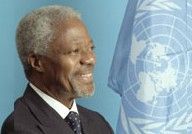Annan urges UN to issue strong warning on Sudan fighting
NAIROBI, Nov 18, 2004 (AP) — U.N. Secretary General Kofi Annan Thursday called on the Security Council to issue “the strongest warning” to the forces fighting in Sudan to bring an end to the civil wars there.
 “I regret to report that the security situation in Darfur continued to deteriorate despite the cease-fire agreement signed earlier,” Annan told Security Council members, who began extraordinary meetings in the Kenyan capital Nairobi. “Both the government and its militias as well as the rebel groups have breached these agreements.”
“I regret to report that the security situation in Darfur continued to deteriorate despite the cease-fire agreement signed earlier,” Annan told Security Council members, who began extraordinary meetings in the Kenyan capital Nairobi. “Both the government and its militias as well as the rebel groups have breached these agreements.”
The council was expected to hear from representatives of the African Union, the regional Intergovernmental Authority on Development, the Sudanese government and the Sudanese People’s Liberation Army, the main southern rebel group.
The U.S. ambassador to the U.N., John Danforth, called the meeting to give members a chance to meet with experts working to end the fighting and suffering in Sudan ‘s western Darfur region, as well as those hoping to wrap up a peace deal to end a 21-year civil war in southern Sudan .
“The strongest warning to all the parties that are causing this suffering is essential,” Annan said.
“When crimes on such a scale are being committed, and a sovereign state appears unable or unwilling to protect its own citizens, a grave responsibility falls on the international community, and specifically on this Council,” he said.
After a brief meeting with Nairobi-based aid agencies and civil groups Friday morning, the council was scheduled to adopt a resolution on Sudan .
A draft of the resolution promises financial and political support for any peace agreements reached to end the violence in Sudan , but members had yet to agree on whether the council should threaten to impose sanctions or take any other kind of action should any party to the conflict fail to obey a cease-fire or allow aid agencies access to civilians in need of help.
U.S. Secretary of State Colin Powell has called the violence in Darfur a genocide and in September accused four Security Council members – China, Russia, Algeria and Pakistan – of valuing their business deals in Sudan over humanitarian concerns. All four abstained from an 11-0 vote to set up a commission to investigate the genocide charges against Sudan .
Ahead of Thursday’s meeting in Nairobi, human rights groups deplored the Security Council’s failure to take a harder line, insisting that an arms embargo or the explicit threat of sanctions was needed against the Sudanese government.
London-based Amnesty International has called for the council to impose an immediate arms embargo on the Sudanese government. In a report released Tuesday in Nairobi, the group said government forces were involved in crimes against humanity in Darfur and arms supplies should be shut off.
Oxfam International said the council had failed Africa by not doing more to stop the continuing conflicts on the continent.
“We urge the council to turn words into concrete actions to stop the ongoing violence and address the humanitarian crisis in Darfur,” Caroline Nursey, the aid agency’s regional director, said.
Human Rights Watch released a statement Thursday saying the world’s failure to prosecute those responsible for crimes against humanity in southern Sudan led to the atrocities in Darfur.
“Unless they are held accountable for abuses in the south, the Sudanese authorities will continue to believe they can get away with murder in Darfur,” Jemera Rone, Sudan researcher for the New York-based group, said.
Sudanese Vice President Ali Osman Taha told the Security Council his country is committed to peace, saying “the war in Darfur is of a political nature, it has been instigated by local parties who receive support from foreign parties.” He didn’t elaborate.
Taha called on the international community to help Sudan disarm and demobilize the fighters in his country and begin reconstruction.
John Garang, the leader of the southern Sudan People’s Liberation Army, told members that only four issues remain to be resolved before a comprehensive agreement ending the southern war can be signed, which should happen by the end of the year.
Ending the southern war will help keep chaos from engulfing Sudan , where a number of small insurgencies are growing, he said.
“The situation in Darfur is rapidly degenerating into chaos and anarchy as the government’s counterinsurgency policy…has seriously boomeranged,” he said, adding that “the government has recently rebuffed a coup attempt.”
